BLOG
Malaysians are Worryingly Less about Covid and More About Income

Since early 2020, the biggest concern in the globe has been the Covid-19 pandemic. While only a few predicted it to last this long, none was prepared for its effects. Beyond being a health concern, the virus has also proven to be a social and financial epidemic.
According to data, the pandemic has cost the global GDP a whopping $2.96 trillion. This is primarily due to the disruption of various industries and work structures as well as the reduced consumption of goods. However, as 2022 approaches, governments and private sector players are upbeat about the prospects of economic recovery.
While the positivity can be applauded, it’s not enough. With new waves and variants of the virus emerging after every few months, it’s the vaccination efforts that will shape outcomes. In this regard, one country is leading by example; Malaysia.
Read on to learn how Malaysians are now less concerned about the virus and more focused on getting back to work.

Effects of Covid-19 in Malaysia
Since the Spanish Flu of 1918, which wiped out 1% (34,644) of the then British Malaya, COVID-19 is the worst communicable disease to hit Malaysia. At the time of writing, total coronavirus cases in Malaysia stand at 2,728,203, and the death toll is 31,221.
As with other Southeast Asian countries, Malaysia was able to limit the spread of the virus in 2020. At the time, the nations were heralded as the prime examples for the world to follow. However, in 2021, things took a drastic turn. The rates of domestic transmissions and death tolls increased alarmingly.
There were various reasons for this sudden change in fortunes in Malaysia. Key among them was a decreasing concern about the virus among Malaysians. As a result, they were less cautious and were slow to get vaccinated.
At some point, COVID-19 infections in Malaysia rose to over 24,500 in a day. This prompted the government to take strict lockdown and stay-at-home measures. During this period, a large proportion of Malaysians stopped working at some point. After a few weeks without income and depleted savings, many families were living on one meal daily.
Another worrying trend that emerged was a rise in suicide cases. In the first five months of 2021, there were 468 suicide cases. In the two years before, the numbers stood at 631 and 609.
With such levels of distress, the ‘white flag’ campaign was launched. Through it, any household that erected a white flag would receive food from well-wishers, businesses, and celebrities.
Vaccination Efforts in Malaysia
In light of the growing risk, the Malaysian government increased efforts towards availing vaccines. Accompanying them were sensitization campaigns to encourage residents to be receptive to vaccination. In doing so, Malaysia has one of the highest vaccine uptakes in the world.
According to Prime Minister Datuk Seri Ismail Sabri Yaakob, Malaysia now has a vaccination rate of 96% among adults. However, that’s not all. They’re also administering additional doses. These come in two ways; extra doses for individuals who did not get full protection from the primary vaccination and booster shots for fully vaccinated persons.
Moreover, the government is also administering vaccines for people in the age group of 12-17, with close to 70% reach thus far. Due to such efforts, Malaysia is again being lauded for its swift response in mitigating the pandemic. As a result, the nation is now among the top 10 with the most vaccinations.

Income Concerns Are Next
Although there are still present concerns with the pandemic which has continued to evolve and produce new strains prompting constant diligence from the populace, the pandemic no longer dominates the Malaysian conversation. Improving response times and a normalisation of safety protocols have allowed the average working citizen to continue with their lives with little disruption. In other words, it’s back to business.
However, this comes with a caveat. The drastic changes Malaysians were subjected to economically during the pandemic still linger. Companies downsized while others looked to a change of career to suit changing needs. The gig economy has more freelancers today than it ever has in history, and many more have turned to entrepreneurship, looking to make ends meet with their own two hands.
According to data from the World Bank, as of March 2020, which was before the pandemic, 53% of adults in Malaysia were employed. However, during the height of the pandemic, as much as 34% stopped working at some point. For those who continued working, 27% reported reduced income.
Role of Connectivity in Supplementing Income
There is no doubt that digitisation has played a huge role in providing a platform for Malaysians to continue thriving. Many businesses have embraced flexible models, with physical workspaces growing smaller as remote working becomes the norm. Freelancers market their skills through online portals, making connections with clients and collaborating on work through the cloud.
Increasing demand for services such as food delivery, personal shopping and more means that more and more workers are needed to supplement these fields, something Malaysians have been quick to embrace.
All this stretches beyond the confines to direct income. Many Malaysians will find themselves in need of retraining and will want to pick up new skill sets to survive changes in demand. Online courses will play a bigger role than ever in allowing this to happen, helping to fill the gap between unemployment and business needs.
Allo - Increasing Connectivity in Malaysia
Considering the need for increased connectivity in Malaysia and the opportunities it offers, having a reliable service provider is essential. Allo Technology will continue to be there for Malaysians, supporting the online national fiberisation rollout and making sure more Malaysians have access to quality connectivity, both in the home and workplace.
